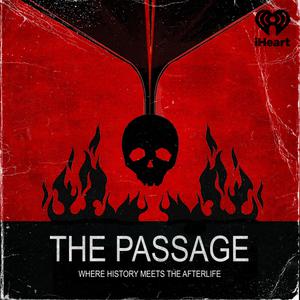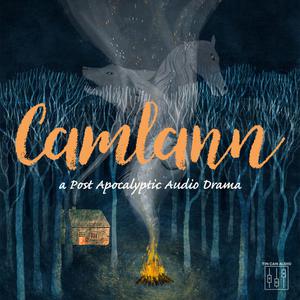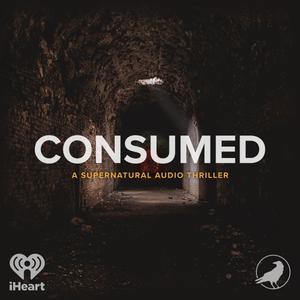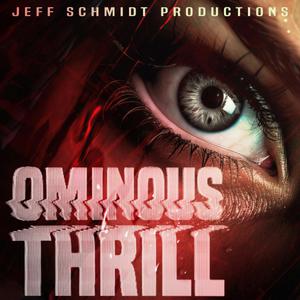
The Passage
iHeartPodcasts
THE PASSAGE takes you on a ride into the land of the dead, traveling with the Ferryman as he collects America’s most illustrious spirits and delivers them to the hereafter. The price of their passage? Their story. Built on a foundation of historical relevance and structured by a kind of dream logic, THE PASSAGE is an immersive audio experience that invites listeners to explore the collective American psyche from the perspective of its most legendary figures. Here we are guided by the Ferryman of souls– with a voice that sounds like it’s been siphoned from a lake of bourbon and fire, and resonating with the depth and gravitas of Dan Fogler (Fantastic Beasts And Where To Find Them, The Walking Dead). The Passage is penned by a brilliant and diverse pool of writers and performed by an unforgettable cast, each episode of this anthology promises a new tale of American odyssey, from madness and monsters to conviction and courage. Each passenger tells their own extraordinary and often terrifying tale to influence the Ferryman’s final destination— be it a comfortable place of eternal light, a haunted purgatory of regret, or one of the nine rings of hell. These are the tales that shaped the soul of the nation. Created by filmmaker Dan Bush (Tomorrow’s Monsters, The Mantawauk Caves) and writer, Nicholas Tecosky, and a co-production of iHeartPodcasts, and Psychopia Pictures, The Passage is a riveting, immersive anthology featuring performances by Wes Studi (The Last of the Mohicans / Geronimo: An American Legend), Martin Starr (Freaks and Geeks / Silicon Valey), Tristan Mack Wilds (The Wire / Red Tails), and Scott Haze (Child of God, Jurassic World Dominion). Headphones are recommended.
- 35 minutes 4 secondsEpisode 12: THE PASSAGE OF TYPHOID MARY
In this hauntingly evocative episode, the ferryman, brought to life with the profound resonance of Dan Fogler's voice, guides a soul whose legacy is as complex as it is misunderstood. Mary Mallon, known to history as Typhoid Mary, voiced by Therese McLaughlin, steps aboard, her story a chilling reminder of the fine line between victim and villain, between innocence and culpability.
As the vessel navigates the murky waters of moral ambiguity, Mary recounts her life, marked by an invisible specter that cast a long shadow over her existence. This "shadow man," a personification of death and disease, becomes a constant companion, a dark figure lurking in the peripheries of her vision, a harbinger of the outbreaks that follow in her wake.
In this episode, we delve into the depths of Mary's psyche, exploring the experience of being branded a pariah, the first known asymptomatic carrier of typhoid fever in the United States. Quarantined for nearly three decades, Mary's existence became a living testament to the fear and misunderstanding surrounding infectious diseases– a dread that is alive and well today.
But beneath the surface of this tragic tale lies a deeper question: Was her "shadow man" merely a monster, the embodiment of the death she unwittingly spread, or was he her ally, a warning of the unseen dangers she posed? As Mary reflects on her life, she reveals the anguish and defiance of a woman caught in the gears of the Industrial Revolution, witnessing first-hand the suffering of workers and the impoverished. Did she weaponize herself against the wealthy families she served, turning her condition into an instrument of vengeance or retribution for the injustices she observed?
Written by Nicholas Tecosky
See omnystudio.com/listener for privacy information.
17 April 2024, 7:01 am - 34 minutes 25 secondsEpisode 11: THE PASSAGE OF FRANK LLOYD WRIGHT
In this emotionally resonant and poetic episode of The Passage, the Ferryman navigates the complex structural and emotional landscapes crafted by one of America's most iconic figures. Frank Lloyd Wright, voiced by Michael Cooke (Mulholland Drive), a visionary architect, designer, and educator, awaits in a realm of his own creation—a self-designed purgatory where the lines of genius and sorrow blur.
As they traverse this meticulously constructed space, a manifestation of Wright's philosophy of organic architecture harmonizing with humanity and the environment, the Ferryman engages with the architect in a dialogue that spans the spectrum of creativity and tragedy. Wright reflects on his illustrious career, a span of seven decades during which he shaped the architectural movements of the twentieth century and left an indelible mark.
However, the conversation soon delves deeper, into the shadows of a personal tragedy that haunted Wright—the brutal mass murder at his beloved Taliesin estate. While he was away, his mistress, her children, and his servants were mercilessly killed, a horrifying act that imprinted itself upon his soul and cast a long shadow over his achievements and days.
In this episode, the Ferryman becomes a visitor in Wright's self-imposed exile, a space where the great architect grapples with the duality of his legacy—of monumental creations and an intimate catastrophe. Wright confronts the haunting questions of regret and blame, pondering the price of greatness and the fragility of the human spirit amidst the structures meant to celebrate and shelter it.
In this episode of The Passage, listeners are invited to explore the inner chambers of Frank Lloyd Wright's mind and heart, where the foundations of brilliance are interwoven with the tremors of personal loss and remorse.
It’s a journey through the corridors of creativity and the hidden alcoves of grief, where the blueprint of regret forms the architecture of a soul seeking peace and understanding.
Written by Christeene Alcosiba
See omnystudio.com/listener for privacy information.
10 April 2024, 7:01 am - 35 minutes 44 secondsEpisode 10: TIMOTHY LEARY’S LAST TRIP
In this mesmerizing and introspective episode of The Passage, the Ferryman, voiced by Dan Fogler (Fantastic Beasts And Where To Find Them, The Walking Dead), ushers in a passenger whose journey through the realms of consciousness transformed a generation. Timothy Leary, voiced by Martin Starr (Freaks and Geeks / Silicon Valley), an emblem of the psychedelic revolution and a figure of boundless controversy, steps aboard, his legacy a kaleidoscope of enlightenment, rebellion, and the quest for transcendence.
As they navigate the swirling mists of perception and reality, Leary recounts his odyssey—a saga marked by his advocacy for psychedelic drugs, his countless encounters with the law, and his daring escapes from the confines of societal norms. Lauded by some as a brave neuronaut and a hero of American consciousness, and vilified by others as the most dangerous man in America, Leary's life is a testament to the power of ideas to ignite change and challenge the status quo.
In this episode, the Ferryman delves beyond Leary's counter-culture exploits and confrontational persona, uncovering the multifaceted individual behind the myth. Leary reflects on his journey, from his groundbreaking research in psychology to his role as a pied piper of the mind-expanding sixties, inviting listeners to reconsider the man whose mantra, "Turn on, tune in, drop out," became the soundtrack of an era.
But as the journey reaches its zenith, a sobering revelation emerges—despite his mastery in escaping the physical and mental confines of the conventional world, there are fates from which even the most adept escape artist cannot flee. Leary confronts the ultimate trip, a voyage from which there is no return, and in doing so, he is forced to face the essence of his own legacy and the ripples it left in the fabric of society and individual consciousness.
In this episode of The Passage listeners are invited to embark on a journey through the mind and legacy of Timothy Leary, exploring the delicate interplay between freedom and consequence, enlightenment and delusion.
Traverse the uncharted territories of the human psyche, where the tales of Timothy Leary, the Psychedelic Sage, challenges our perceptions of reality and legacy. Tune in, and join us on the final trip, where the boundaries of consciousness are transcended. Written by Rob Mosca.
See omnystudio.com/listener for privacy information.
3 April 2024, 7:01 am - 29 minutes 14 secondsEpisode 9: THE PASSAGE OF KITTY GENOVESE
In this poignant and introspective episode of The Passage, the Ferryman, voiced with the profound depth and empathy of Dan Fogler (Fantastic Beasts And Where To Find Them, The Walking Dead), encounters a soul whose name became a symbol, a headline that seemed to speak volumes about the state of society. Kitty Genovese, voiced by Allie MacDonald, a young woman whose tragic fate sparked outrage and introspection, takes a cab ride across the void, her story a mosaic of unfulfilled dreams and a narrative hijacked by sensationalism.
As the taxi glides through the misty realms of memory and myth, Kitty reflects on her life beyond the infamous headlines. She shares her hopes, her aspirations, and the vibrant life she led—a life rich with potential and promise, yet brutally cut short on the streets of New York. Her story, for too long, was not her own, morphed by the media into a stark emblem of societal apathy and the supposed decay of communal compassion.
In this episode, the Ferryman listens intently as Kitty reclaims her narrative, her voice a gentle yet powerful rebuke to the decades of misrepresentation. She speaks of the people she loved, the dreams she nurtured, and the life she lived, not just the final moments that came to define her in the public eye.
Kitty's story challenges the listeners to reflect on the narratives we construct and the truths we choose to see or ignore. Her presence in the Ferryman's cab is a reminder that behind every headline, every statistic, is a human story, rich and complex, deserving of understanding and dignity. Written by Mykal Alder June.
See omnystudio.com/listener for privacy information.
27 March 2024, 7:01 am - 33 minutes 49 secondsEpisode 8: PEG ENTWISTLE'S FINAL ACT
Hollywood, California, 1932. In this poignant and introspective episode of The Passage, the Ferryman, voiced by the compelling Dan Fogler (Fantastic Beasts And Where To Find Them, The Walking Dead), encounters a soul whose tragic end is as iconic as the Hollywood sign she leapt from. Peg Entwistle, voiced by Sinéad D’arcy, a name forever etched in Hollywood's lore, steps into the limelight one last time, her passage to the afterlife marked by the soft purr of a limousine's engine.
As the vehicle glides through the mists of memory and regret, Peg recounts her story, a narrative steeped in the glitter and shadows of the entertainment industry. With only one film to her name, her ambition to be a real actress—a beacon of integrity and artistry in a sea of commercialism—remains a poignant testament to her dreams.
Peg reflects on the complex struggle between art and commerce, between the authentic self and the personas crafted by studio magnates. Her tale is one of aspiration and despair, an intricate dance between the dazzling allure of fame and the stark reality of an industry that manufactures dreams with one hand while shattering them with the other.
Was Peg Entwistle a victim of a merciless entertainment machine, a system that viewed actors as commodities in the relentless pursuit of profit? Or was her downfall a consequence of her own self-doubt, a personal tragedy amplified by the unforgiving spotlight of Hollywood?
As the limousine journeys through the ethereal landscape, the Ferryman listens, his presence a silent witness to the unfolding drama. Peg's story is a mirror reflecting the eternal struggle of artists throughout the ages—seeking validation and meaning in a world that often values the superficial over the substantive.
In this episode of The Passage, listeners are invited to explore the fragile boundary between ambition and despair, between the radiant illusions of stardom and the stark realities that lurk behind the silver screen. Written by Kit Fay.
See omnystudio.com/listener for privacy information.
20 March 2024, 7:01 am - 41 minutes 56 secondsEpisode 7: THE PASSAGE OF J. EDGAR HOOVER
In this gripping and thought-provoking episode of The Passage, the Ferryman, voiced by Dan Fogler (Fantastic Beasts And Where To Find Them, The Walking Dead), welcomes a passenger whose name is synonymous with power, secrecy, and the watchful eyes of surveillance. J. Edgar Hoover, voiced by Stewart Skelton, the architect of modern intelligence and a figure shrouded in controversy, steps aboard, his presence casting a long shadow over the realms of the afterlife.
As they journey through the misty corridors of history and consequence, Hoover reflects on his legacy, a complex web of protection and paranoia, of defense and dominion. Under his watch, an agency was built, not just to safeguard America, but to scrutinize its every heartbeat, its every whisper. Surveillance became a weapon, a shield and a sword in the hands of a man who viewed the world through a lens of suspicion and control.
In this episode, Hoover is confronted with the eternal question: Was he America's stalwart defender, standing vigilant against the tide of threats, or did he morph into the very monster he vowed to vanquish, a manifestation of fear and power unchecked?
As the Ferryman guides Hoover deeper into the voyage, a moment of confession arises. Hoover reveals his greatest secret, a truth so potent and terrifying that it threatens to unravel the fabric of national security and trust. But is this secret a genuine revelation, a stark insight into America's deepest fears, or merely a self-fulfilling prophecy birthed from the depths of Hoover's own paranoia? Written by Ben Bowlin.
See omnystudio.com/listener for privacy information.
13 March 2024, 7:01 am - 30 minutes 34 secondsEpisode 6: THE PASSAGE OF JIM JONES
Jonestown, Guyana. November 18, 1978. In this chilling and thought-provoking episode of The Passage, the Ferryman, with his voice resonating with the depth and gravitas of Dan Fogler (Fantastic Beasts And Where To Find Them, The Walking Dead), confronts a figure whose name is synonymous with betrayal and tragedy. Jim Jones, voiced by Scott Poythress, the charismatic and manipulative leader responsible for the Jonestown Massacre, steps aboard, his silver tongue ready to weave a narrative of justification and delusion.
As his car traverses the murky waters of morality and madness, Jim Jones attempts to cast himself in the light of a misunderstood revolutionary, a man who sought to offer sanctuary to those disillusioned with the American dream. He speaks of his vision for a utopia, a haven for those who lost faith in society and yearned to belong to a community that promised equality, love, and salvation.
Yet, the Ferryman listens with a knowing silence, for the air is heavy with the unspoken truths of the horrors that unfolded under Jones's command. The specters of Jonestown loom in the shadows, a grim reminder of the lives lost to the poisoned chalice of blind devotion and the dangerous allure of absolute power.
Jim Jones, the master manipulator, tries to paint his actions as noble, his intentions pure, but the echoes of the past speak louder than his serpentine words. Hell awaits him, a reckoning for the souls he led astray, for the innocence he shattered, and for the ultimate betrayal of the trust bestowed upon him by those who sought hope and found despair.
In this episode of The Passage, listeners are invited to confront the darkest corners of human nature, where the search for belonging and meaning can lead to the abyss of fanaticism and destruction. Written by E.M. Westover.
See omnystudio.com/listener for privacy information.
6 March 2024, 8:01 am - 34 minutes 47 secondsEpisode 5: THE PASSAGE OF SUATE STANDING DEER
In this deeply stirring episode of The Passage, the Ferryman, brought to life by the rich voice of Dan Fogler (Fantastic Beasts And Where To Find Them, The Walking Dead), encounters a soul carrying the weight of a nation's tears and a people's fractured spirit. Suate Standing Deer, a composite character representing the complex web of loyalty, betrayal, and survival during the Cherokee removal, steps into the spirit realm, his presence a testament to the immense suffering endured on the Trail of Tears.
As the Ferryman guides him through the fog of history and sorrow, Suate Standing Deer, voiced by the legendary Wes Studi (The Last of the Mohicans / Geronimo: An American Legend) recounts the tumultuous times of the Treaty of New Echota of 1835. He speaks of Major Ridge and the Treaty Party, who, under the suffocating pressure of the federal government, believed that ceding their lands and relocating west of the Mississippi was the only path to preserving Cherokee rights and existence. The divisive treaty not only fragmented their land but also the very soul of the Cherokee Nation.
In the wake of forced removal and the tragic journey that became known as the Trail of Tears, Suate Standing Deer finds himself entangled in the repercussions of the treaty. Blamed for the loss of the ancestral Cherokee lands and the countless lives lost during the removal, Major Ridge's fate becomes a symbol of the deep wounds inflicted upon the Cherokee people.
Suate Standing Deer, chosen as an instrument of retribution according to the Cherokee Blood Law, grapples with the haunting question: Was his act of assassination an assertion of justice and autonomy in the face of overwhelming oppression and despair? Or was he the victim of an infectious bloodlust spread by the encroaching influence of the white man?
As the narrative unfolds, the Ferryman listens, his silent gaze a mirror reflecting the tangled interplay of cultural erosion, survival, and the search for identity in the face of unspeakable loss.
In this episode of The Passage, listeners are invited to traverse the blurred lines between vengeance and justice, between the preservation of tradition and the corrosive impact of external forces. Written by Michael Owl.
See omnystudio.com/listener for privacy information.
28 February 2024, 8:01 am - 23 minutes 55 secondsEpisode 4: THE PASSAGE OF OCTAVIA BUTLER
In this visionary and introspective episode of The Passage, the Ferryman, voiced by Dan Fogler (Fantastic Beasts And Where To Find Them, The Walking Dead), welcomes a soul whose pen crafted worlds and whose imagination reshaped the boundaries of science fiction. Octavia Butler voiced by Juliette Jeffers, a luminary of speculative storytelling and the first science-fiction writer to receive a MacArthur Fellowship, embarks on her final journey, her passage as unique and profound as her literary legacy.
As they traverse the ethereal realms of the afterlife, Octavia reflects on her life's journey—from her humble beginnings in Pasadena, California, where she was raised by her widowed mother, to her rise as a beacon of innovation and diversity in the world of science fiction. Despite her shyness and the racial and societal barriers that stood against her, Butler found solace and strength in the pages of fantasy novels and the infinite possibilities of her own writing.
In this episode, the Ferryman guides Octavia through a passage that mirrors her own narrative style, a landscape where the surreal meets the profound. They encounter the incarnations of her dark and strange creations, each an echo of Butler's fearless exploration of the human condition, of identity, and of the tangled threads of choice and destiny.
As she navigates this dreamscape of her own making, Butler's journey is not just a passage but a celebration of her resilience, her unparalleled vision, and her indelible impact on the genre of science fiction. Her story is a testament to the power of perseverance and the transcendent nature of storytelling.
In this episode of The Passage, listeners are invited to voyage into the rich tapestry of Octavia Butler's mind, where each twist and turn reveals the depth and complexity of her imagination. Written by Nicki Salcedo.
See omnystudio.com/listener for privacy information.
21 February 2024, 8:01 am - 34 minutes 42 secondsEpisode 3: THE PASSAGE OF J. ROBERT OPPENHEIMER
Princeton, New Jersey, February 1967. In a hauntingly reflective episode of The Passage, the Ferryman, with his deep, resonant voice provided by Dan Fogler (Fantastic Beasts And Where To Find Them, The Walking Dead), welcomes a figure whose legacy is as massive and complex as the atom itself—J. Robert Oppenheimer, voiced by Bill Rogers, the father of the atomic bomb. The Ferryman arrives in a '67 Fairlane, a vehicle reminiscent of the ones that shuttled him under the watchful eyes of the FBI during the days of the Manhattan Project.
As the car's engine ticks and cools in the spectral silence of the afterlife, Oppenheimer rides in the backseat, his eyes holding the weight of a creation that forever altered the course of human history. The Ferryman listens intently as Oppenheimer confesses his feelings of profound guilt and his struggle to comprehend the full scope of the suffering inflicted by the atomic bomb—suffering he feels personally responsible for.
Throughout the journey, Oppenheimer wrestles with his desire for redemption. He reveals a startling wish: to endure the afterlife in a manner that mirrors the agony of each soul affected by his creation. But in the realm where the Ferryman guides the lost, desires are dangerous, and the path to atonement is fraught with unforeseen consequences.
Oppenheimer is forced to confront a haunting question: In seeking to share the suffering of his creation's victims, might he instead be bound to a fate far more terrible? The episode explores the delicate balance between guilt, responsibility, and the longing for redemption, set against the backdrop of one of humanity's most profound and troubling achievements.
In this episode of The Passage listeners are invited to journey through the heart of moral ambiguity, where the lines between right and wrong, guilt and atonement, are as blurred and complex as the quantum particles that Oppenheimer spent his life studying. Written by Steven Williams.
See omnystudio.com/listener for privacy information.
14 February 2024, 8:01 am - 28 minutes 9 secondsEpisode 2: THE PASSAGE OF ROBERT JOHNSON
August 6, 1938. The Mississippi Delta. The Badlands… In this hauntingly melodic episode of The Passage, the Ferryman, voiced by the enigmatic Dan Fogler (Fantastic Beasts And Where To Find Them, The Walking Dead), finds himself aboard a steam engine train, its whistle echoing through the twilight of the afterlife. As the train slows to a halt, a figure steps into the dim light, guitar in hand, a shadowy silhouette against the misty backdrop—Robert Johnson, voiced by Tristan Mack Wilds (The Wire / Red Tails), the legendary bluesman whose music was said to be born at the crossroads of despair and genius.
There's not much left of Robert Johnson on Earth, just a handful of records and a legacy shrouded in mystery. But here, in the liminal space between worlds, his story unfolds, a tale as haunting as his music. The Ferryman listens to his presence a silent invitation for the soul of the blues to sing its truth.
Johnson's life was a symphony of sorrow and longing, his music the voice of a nation's grief, suffering, and aching need to belong. He speaks of rejecting the life of a working man for the existence of a wandering spirit, a choice that led him down a path lined with loss and lament. The tragic death of his wife while he was away haunts his melodies, a reminder of the price paid for the life he chose.
As the train chugs through the ethereal landscape, the conversation turns to the legend that has immortalized Johnson—the tale of selling his soul to the devil at a dusty Mississippi crossroads in exchange for unrivaled mastery of the blues. The Ferryman, a collector of stories, is intrigued. Is this myth the key to Johnson's otherworldly talent, or merely a metaphor for the sacrifices and dark bargains made in the pursuit of greatness?
But Robert Johnson has a proposition of his own, a final tune to play in this twilight journey. His fingers dance on the strings, the notes a whisper of light and shadow. What does a man who's already gambled with the devil offer to the Ferryman of souls?
This episode of The Passage delves into the depths of the human spirit, where pain and artistry intertwine, and the crossroads represent the eternal choices that define us. Join us as we ride the rails of fate with Robert Johnson, his life a testament to the power of music to capture the heart of a nation's soul. Written by Steven Williams.
See omnystudio.com/listener for privacy information.
7 February 2024, 8:11 am - More Episodes? Get the App
Your feedback is valuable to us. Should you encounter any bugs, glitches, lack of functionality or other problems, please email us on [email protected] or join Moon.FM Telegram Group where you can talk directly to the dev team who are happy to answer any queries.
 Camlann - An Audio Drama
Camlann - An Audio Drama
 Close Your Eyes
Close Your Eyes
 Uncanny Valley
Uncanny Valley
 The Signal
The Signal
 Consumed
Consumed
 OMINOUS THRILL
OMINOUS THRILL